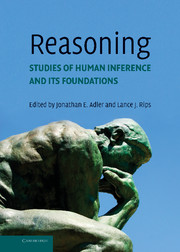28 - Belief Change as Propositional Update
Published online by Cambridge University Press: 05 June 2012
Summary
Introduction
Suppose you need to send an express courier package to a colleague who is away at a conference. You believe that whenever she is in New York City and the New York Rangers are playing a home game, she stays at the Westin Mid-Manhattan Hotel. You also believe that she is in New York City this weekend and that the Rangers are playing this weekend as well. You call up the Westin Mid-Manhattan Hotel and you find out that she isn't there. Something doesn't fit. What do you believe now? Well, assuming that you accept the hotel's word that she isn't there, there are various (logically consistent) ways to reconcile the contradiction between what you used to believe and this new information. First, you could believe that she is in New York City and that the Rangers are indeed playing, but disbelieve the conditional that says whenever both of these are true, then she stays at the Westin Mid-Manhattan Hotel. Alternatively, you could continue to believe the conditional, but decide that either she isn't in New York this weekend or that the Rangers aren't playing a home game (or possibly both). Which do you choose as your new set of beliefs?
Belief change – the process by which a rational agent makes the transition from one belief state to another – is an important component for most intelligent activity done by epistemic agents, both human and artificial.
Information
- Type
- Chapter
- Information
- ReasoningStudies of Human Inference and its Foundations, pp. 566 - 596Publisher: Cambridge University PressPrint publication year: 2008
